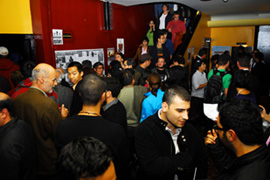Palestinian diaspora on film
Palestinians ‘invisible’ in mainstream US media, say Toronto film festival organisers.

 |
| Nitin Sawhney, festival adviser, says the event breaks the cycle of ‘viewing Palestinians only through the lens of terrorism or pure sympathy’ [Picture: Eduardo Oliveira] |
Only a few weeks after the eruption of an international controversy around the Toronto International Film Festival’s (TIFF) choice of Tel Aviv for its inaugural City to City spotlight, the Israeli-Palestinian conflict is once again taking to the big screens.
| in depth | |||||||||||
|
From living in exile to childhood under occupation, the week-long Toronto Palestine Film Festival, which opened on September 26, will examine several dimensions of Palestinian identity through cinema.
In its second edition, the Festival will screen 34 films over seven days in several locations across Greater Toronto.
Keep reading
list of 4 itemsInside the pressures facing Quebec’s billion-dollar maple syrup industry
‘Accepted in both [worlds]’: Indonesia’s Chinese Muslims prepare for Eid
Photos: Mexico, US, Canada mesmerised by rare total solar eclipse
Although many of the films are critical of Israeli policies towards the Palestinians, organisers tell Al Jazeera that they anticipate no protests and “look forward to building on the great success of last year”.
Dania Majid, one of the festivals main organisers, has lived in Canada her entire life and sees the festival as a way “to connect Toronto audiences to Palestine and the Palestinian narrative”.
“The festival also creates a mechanism to support Palestinian filmmakers and artists who have to undergo tremendous obstacles to produce their works and get them shown around the world,” she adds.
Hollywood stereotypes
The festival is set to open with the Canadian premiere of Amreeka, an internationally acclaimed film telling the story of a single mother and her teenage son who move from the West Bank to a small town in Illinois.
Cherien Dabis, the film’s Palestinian-American director, says that her involvement in film is a response to “Hollywood and the American news media perpetuating stereotypes of Arabs”.
 |
| The film festival is partly funded by the expat Arab community [Picture: Eduardo Oliveira] |
“Festivals that specially support Palestinian films are incredible and they can really harness the power of Arab communities around the world,” Dabis says.
In its second year, festival organisers tell Al Jazeera they are keen to create “a prominent Palestinian cultural institution in Canada”.
For the first time, the festival will feature programming around Palestinian food and contemporary art to highlight different elements of Palestinian culture.
Isam Al Kaisi moved to Toronto from Bethlehem in 1987. He currently works as a head chef in his own restaurant serving food he describes as a “reinterpretation of Arab cuisine for a Western appetite”.
Al Kaisi will be hosting Sahtain! Film & Food Brunch, where moviegoers will be treated to food-themed films while being able to taste many of the dishes featured on the big screen.
“Food is a significant cultural symbol for Palestinians because so many dishes are connected to the land, and hundreds of years of history on that land,” Al Kaisi says.
Another new edition to this year’s festival programme is an art exhibit featuring video installations and multimedia displays.
According to festival organisers the exhibits offer “nuance and depth to the narratives of Palestine and the diaspora so often simplified in the West”.
‘Zionist voice dominant’
Reena Katz, a Canadian artist, will be curating the exhibit, entitled Jewels in the Machine: New Media Works.
The exhibit will feature the works of several artists from around the world, including Palestine itself.
“Being a Jewish artist, I feel it is very important to be active in the Jewish community and beyond, in education and specifically discussing Palestinian invisibility,” she tells Al Jazeera.
|
“We wanted to … say that Palestinians in the diaspora remember Palestine, and that we are still fighting for the right to return” Rafeef Ziadah, festival director |
“I feel that there is a real imbalance in society between Palestinian voices and more dominant Zionist ones,” she says.
The exhibit will also feature a multi-screen multimedia installation comprised of stop motion animation narrated by travellers venturing through the West Bank.
Road Movie, directed by Elle Flanders, examines what she describes as: “Apartheid roads because they are only accessible to those holding Israeli identification.”
Flanders tells Al Jazeera that the film is part of her work to find “a cultural way to put an end to conflict and end the occupation”.
The Toronto festival is one of many events around the world that focus on Palestinian film.
Cities such as London, Sydney and Houston have also added similar initiatives to their cinema events.
Diaspora remembered
Nitin Sawhney, an advisor to the TPFF, is also one of the founders of the Boston Palestine Film Festival.
Growing up in the Middle East, the MIT professor of Indian origin, says that Palestinian film festivals break the cycle of “viewing Palestinians only through the lens of terrorism or pure sympathy”.
“What’s missing is what’s in between, which is everyday Palestinian lives, culture, history, love, traditions, music and everything else that doesn’t fall into those two buckets,” Sawhney says.
Although the festival receives funding from different governmental art councils, the budget of the volunteer-run event is largely boosted by support from within the Arab community.
Rafeef Ziadah, the festival’s director, says that support is, in itself, one of the festival’s key goals.
“It is very important to keep the history of Palestine alive and to let the younger generations know about this history,” Ziadah says.
“Last year was the sixtieth anniversary of the Nakba, and we wanted to do something to say that Palestinians in the diaspora still remember Palestine, and that we are still fighting for the right to return.”
The Toronto Palestine Film Festival will run from September 26 to October 2, 2009. For more details visit: www.tpff.ca
